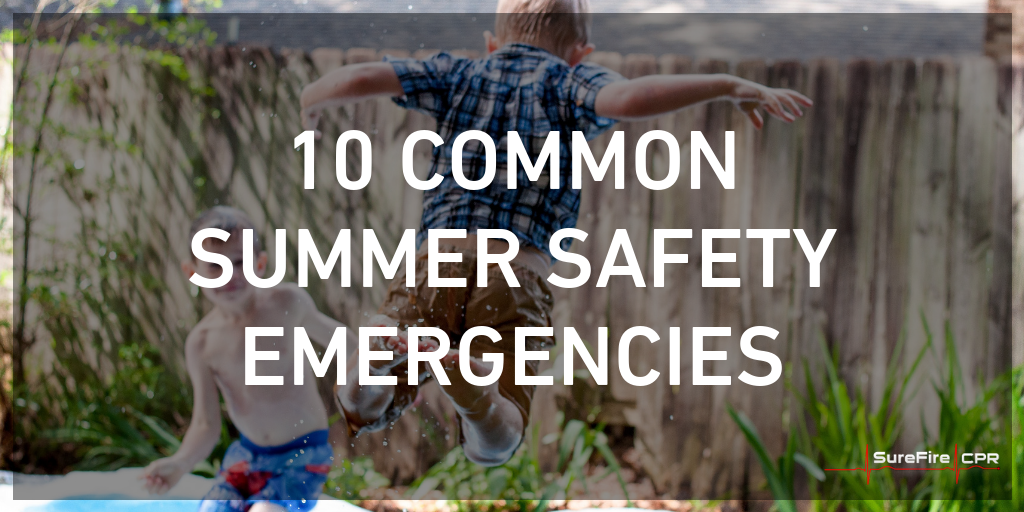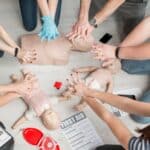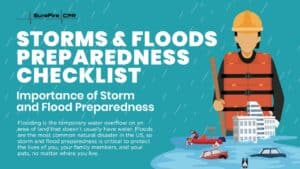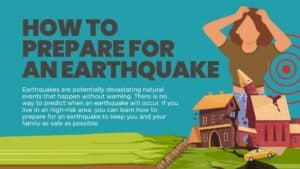Summer is a time of fun, sunshine, and outdoor activities of all kinds. Although it is the favorite season for many kids and adults, summer is also a time of increased safety risks. From bug bites and sunburns to swimming accidents and sports injuries, there are a myriad of common summer emergencies just waiting to strike. Thankfully, with proper care and preparation, you can prevent many of these emergencies and effectively address them if they do strike. In this guide, our emergency response experts here at SureFire CPR will show you how.
1. Heat Exhaustion and Heat Stroke
Of the many safety risks common in summer, few are more omnipresent than heat. During the summer season, temperatures can climb into the triple digits in most regions of the U.S. Even in cooler regions, summer temperatures can still swell well above 80°F, hot enough to cause health concerns for the human body.
Heat exhaustion occurs when the body is exposed to excessive heat for long periods of time. Heat exhaustion is caused by water depletion (also known as “dehydration,” discussed below) and/or salt depletion in the body. Heat exhaustion can be exacerbated by physical activity and is of particular concern during summer sporting events. Symptoms of heat exhaustion due to water depletion include muscle weakness, headache, excessive thirst, and loss of consciousness. Symptoms of heat exhaustion due to salt depletion include dizziness, nausea and vomiting, and muscle cramps. If you or someone you know is showing signs of heat exhaustion, get out of the heat and into a cool shady place where you can rest, and drink plenty of fluids.
If left untreated, heat exhaustion can lead to heat stroke, a more serious condition in which excessive exposure to heat causes the body’s temperature control system to fail. By the medical definition, heat stroke occurs when the body’s temperature rises to at least 104° and neurological complications begin to manifest. Aside from body temperature, complications are displayed as observable symptoms including seizures, visible confusion or disorientation, nausea, and sometimes loss of consciousness. If you suspect that you or someone else is experiencing heat stroke, call 911 immediately. Delaying medical attention to can lead to permanent damage to the brain and nervous system.
2. Dehydration
A close cousin of heat-related emergencies, dehydration is a widespread problem whereby the body is not supplied with enough water. Dehydration is far more common in the summer season, as high temperatures and excessive sunlight can quickly diminish the body’s water supply. However, lost fluids can occur for a number of reasons, including bowel movements, neglecting to eat or drink, sustained physical activity, and illness such as fever. When these fluids are not replenished, the body can experience symptoms of dehydration, which include a dry or sticky mouth, dark yellow or orange-ish urine, headache, muscle cramps, dry and cool skin, dizziness, fatigue, and, of course, thirst. If you or someone else is feeling dehydrated, administer treatment by ingesting fluids and eliminating whatever other conditions might be causing dehydration. If you’re working out, stop. If you’re in the sun, find shade. This will allow your body to rehydrate effectively.
3. Swimming Injuries and Drowning
As summer temperatures swell, kids and adults alike take to the water for relief. Pools, lakes, ocean beaches, and other bodies of water fill up with eager swimmers in search of fun and reprieve from the sun. Though soothing and entertaining, these bodies of water present many risks to summer swimmers. Swimming injuries and drowning can befall those who are unprepared for the water. Kids are the most at-risk, as they are often the weakest swimmers. This common summer emergency risk can be greatly mitigated by swim lessons, where kids can learn how to move effectively in water and stay afloat in the event of an emergency. Over-exertion is another cause of swimming injuries and drowning — so if you’re thinking about jumping in the water, know your limits. Stay away from turbulent seas where rip currents may lurk, and never push yourself too hard in the pool, as this can lead to muscle cramps and fainting.
While it’s always best to swim where there is a lifeguard on duty, this isn’t always feasible. In cases where there is no lifeguard present, it’s crucial that someone in your party knows CPR to properly address a swimming emergency. To prepare yourself for the water this summer season, we recommend enrolling in a CPR course to learn how to properly administer CPR and earn your CPR certification.
4. Skin Injuries: Burns and Cuts
Though it may feel good at first blow, the summer season presents a number of increased risks for the skin. With more sunlight and fewer clothes, summer leads to an increased risk of sunburn. Ranging from mild to severe, sunburns can lead to itching, irritation, and intense pain. They can also permanently damage the skin and lead to skin cancer. Thankfully, sunburns can be easily prevented with sunscreen and extra clothing when necessary. Invest in well-reviewed sunscreen (we recommend at least SPF 50), sunglasses, and a hat to keep your head and face extra-protected from the sun.
Sunburns aside, cuts, scrapes, and bruises are other skin-related injuries that can befall people of all ages during the summer. Warmer weather means increased activity — especially outdoors. This can lead to more falls, accidents, and brushes with inanimate objects. To learn how to properly address these skin injuries, we recommend taking a basic first aid course to learn the ins and outs of first aid and earn your first aid certification.
5. Bee Stings, Wasp Bites, and Other Bugs-Related Emergencies
As the weather gets warmer, bugs of all kinds come out to play. And when we say play, we mean bite and sting. Some of the most common bug-related injuries that occur during the summer months are bee stings, wasp bites, tick bites, and mosquito bites. Each of these bug-related injuries is irritating at best and deadly at worst. Mosquitoes and ticks can transmit diseases like Lyme Disease, Rocky Mountain Spotted Fever, and West Nile Virus, while bees and wasps can cause serious health issues for those with allergies (discussed below). If you or someone you’re with has sustained an injury from a bug, seek medical attention if symptoms such as swelling, difficulty breathing, and numbness increase in severity.
6. Food Poisoning
Summer is peak season for food. Graduation celebrations, backyard barbecues, birthday parties, and many other get-togethers abound in the summer months. Nearly all of them have things to eat. Likewise, trips to local food trucks, fast food joints, markets, sit-down restaurants, and other eateries are common practice when the weather is nice. Again, food is a central feature of these destinations. Though almost always delicious and satisfying, in rare cases food can lead to food poisoning if contaminated or improperly prepared. Signs of food poisoning include nausea, vomiting, diarrhea, and achiness. Though most symptoms will pass in a day or two, some may linger or worsen. In these rare cases, it’s best to seek medical attention, as allergies or an infection may be the culprit.
7. Poison Ivy, Poison Oak, and Poison Sumac
Everyone spends more time outdoors in the summer. Some people even take things a step further and go hiking and camping. While the “great outdoors” certainly are beautiful, they also harbor a few health hazards not commonly found in town. Among these are three plants — poison ivy, poison oak, and poison sumac — that can induce moderate to severe topical reactions if they come into contact with the skin. To treat the itchiness and irritation caused by these plants, use calamine lotion, zinc carbonate, or zinc oxide. To avoid contact with these plants altogether, always wear long-sleeved shirts and pants when hiking, and stay on the trails.
8. Sports Injuries
Rec leagues, youth sports, impromptu park competitions, and more — all of these sporting events sprout up like growing grass in the summer. Exhilarating and a good source of exercise, summer sports can also be a source of injuries, such as broken bones, muscle cramps and sprains, ligament and tendon tears, concussions, and more. To minimize the risk of these injuries, it’s best to warm up and avoid contact whenever possible. Should one of the injuries befall you or an athlete you’re competing with, knowing how to administer basic first aid can help keep the injury from worsening. If the injury is severe, seek medical attention immediately.
9. Car Accidents
Though the winter season is king of car accidents for many regions, summer is heir to the throne. More people are on the road in the summer, and the increased presence of direct sunlight can greatly diminish visibility for drivers. Always exercise caution when driving in the summer. Use your vehicle’s sun shades and wear sunglasses to improve visibility. In the event that you do become involved in a car accident, knowing how to perform basic first aid and basic life support can enable you to help those injured before emergency responders arrive.
10. Allergies
Last on our list are allergies, one of the most common causes of summer emergencies. Many people suffer from seasonal allergies in summer due to the amount of flora blooming in most areas. For those with severe allergies, summer presents heightened risks at every corner. Outdoor play increases the risk of stings and bites from bees, wasps, and ants. Cookouts and barbecues increase the risk of exposure to common food allergens such as peanuts, dairy products, and wheat. In some cases, allergens can induce anaphylaxis, a severe allergic reaction that can be fatal if left improperly treated. While mild to moderate allergic reactions can be treated with over-the-counter drugs antihistamine drugs, severe allergic reactions should always be treated with epinephrine and a trip to the doctor’s office.
Learn More and Stay Safe This Summer With SureFire CPR
Interested in learning more about how to stay safe this summer? Our experts at SureFire CPR are here to help. Explore our website to learn more about the many emergency response courses and online classes we offer, and contact us to speak with a member of our team directly. Enroll online to sign up for our accredited courses, earn your certification, and make this summer the safest one yet!











